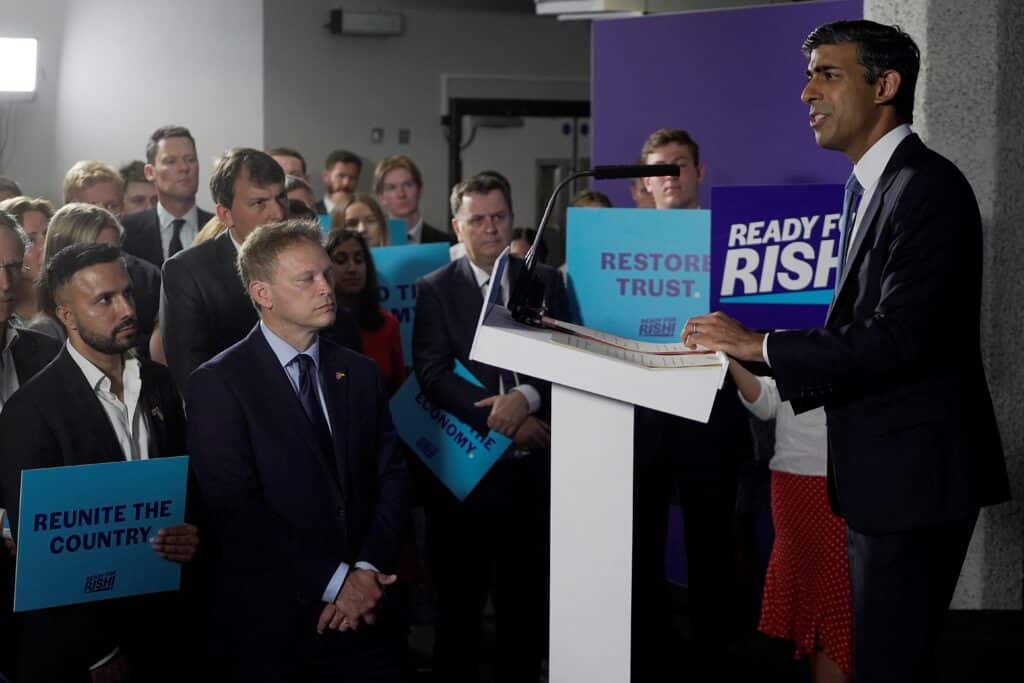Former equalities ministers Penny Mordaunt and Kemi Badenoch top Tory poll for next prime minister

Penny Mordaunt (L) and Kemi Badenoch have merged as early frontrunners in the Tory leadership contest. (Getty Images/Chris McAndrew/Official portrait of Kemi Badenoch)
Penny Mordaunt and Kemi Badenoch are the top choices among Tory party members to take over as leader from Boris Johnson, new polling suggests.
Polling by Conservative Home put trade policy minister Mordaunt, a former women and equalities minister, in the lead with 19.6 per cent support.
Badenoch, who resigned as junior equalities minister amid a mass exodus of Boris Johnson’s government, came in a close second place with 18.7 per cent of the 800 respondents.
The two candidates have previously represented vastly different factions within the Tory party when it comes to LGBTQ+ rights.
Mordaunt has long been considered an ally to the community, having been behind pledges to ban conversion therapy for all LGBTQ+ people and to reform the Gender Recognition Act. Both policies were ditched by Boris Johnson’s government.
However, Mordaunt has been accused of throwing the trans community to the wolves, kicking off her campaign for the Tory leadership by claiming to have opposed “trans orthodoxy” and laying out her view that trans women are different to “biological women”.
Badenoch was an unpopular equalities minister among the LGBTQ+ community, especially after a leaked recording in which she appeared to call trans women “men”. Her campaign so far has seen her rail against “identity politics“.
After the two former equalities ministers, Rishi Sunak, the ex-chancellor of the Exchequer, trailed behind in third place with 12.1 per cent of the vote.
So far Sunak has been endorsed by the most MPs (42, according to the New Statesman), ahead of Mordaunt (25), Tom Tugendhat (20), Liz Truss (19) and Badenoch (17). Candidates must secure 20 endorsements to make it onto the ballot.
Coming in fourth in the Conservative Home poll is attorney general Suella Braverman, a right-wing firebrand who has vowed to stamp out “woke rubbish” and break Britain from the European Court of Human Rights. She netted 11.5 per cent of the vote.
A little over one in 10 readers said they’d back foreign secretary and women and equalities minister Liz Truss. She launched her leadership bid on Monday with a campaign focused on slashing taxes and a return to traditional Tory values.
Home secretary Priti Patel came bottom of the pile, scraping 1.66 per cent, with transport secretary Grant Shapps only topping her by 0.12 per cent.
The 10 candidates vying to replace Boris Johnson offer, overall, similar visions. Many pitch tax cuts to ease the cost of living crisis, while others are still more than happy to send some asylum seekers on a one-way flight to Rwanda.
But if there’s one thing an increasing number of candidates are rallying behind, it’s opposing trans rights

One of Rishi Sunak’s first leadership policies was opposing trans-inclusive sports. (NIKLAS HALLE’N/AFP via Getty Images)
Mordaunt, a former women and equalities minister backed by 25 MPs, U-turned on her support for trans people only moments after announcing her leadership bid. She stressed in a 10-part Twitter thread that she is not “woke” and opposes the “trans orthodoxy”.
She said: “Some people born male and who have been through the gender recognition process are also legally female. That DOES NOT mean they are biological women, like me.”
It came after right-wing newspapers and groups claimed her pro-trans stance would impair her campaign.
Badenoch’s bid to lead Britain saw her rail against “identity politics” which she said is “shutting down debate”.
Sunak launched a “women’s rights manifesto” that sets out his opposition to trans women’s inclusion in sport and the use of gender-neutral language in healthcare.
Braverman told ITV’s Robert Peston on 6 July that she would get Britain “back to a country where describing a man and a woman in terms of biology does not mean that you’re going to lose your job” if she were premier. She so far only has a dozen MPs in her corner.
After Grant Shapps pulled out of the race Tuesday (12 July), there are 10 remaining candidates. Each has until Tuesday night to secure the 20 required nominations, with the first and second rounds of voting among MPs to take place on Wednesday and Thursday.
Successive votes may continue to whittle down the candidates until two remain. That’s when the final ballots kick off, where the more than 100,000 Conservative Party members will pick Britain’s next prime minister.
But it seems Tory members aren’t exactly energised by the current list of contenders.
One survey by The Times found “none of the above” with 12 per cent was the second most popular option among Tory voters asked who should be leader.

